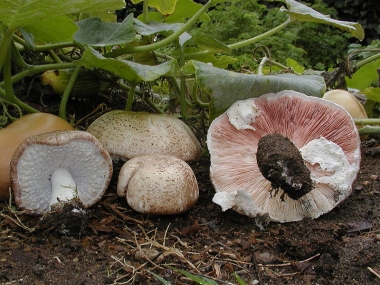Agaricus subrufescens is also known as the Sun Mushroom,Agaricus blazei ,Himetsutake, and Cogumelo do sol.
The history of the Brazilian Agaricus
This mushroom was discovered in 1944 by William Alphonso Murill, one of the most famous American mycologists, during a trip to Florida.
Subsequently, in 1965, scientists from the Pennsylvania State University discovered that people live longer without disease by eating the mushroom. They identified a daily and commonplace consumption ofAgaricus subrufescens in the local population.
In 1974 the "International Congress of Therapeutic Mycology" in Tokyo made the 1965 study public, which earned Agaricus subrufescens the nickname "elixir of long life".
Also in the 1960s, a farmer of Japanese origin in Brazil decided to cultivate Agaricus subrufescens in Japan. It took him about ten years before he succeeded in mastering an intensive cultivation of the mushroom.
How do we recognize this mushroom ?
Agaricus subrufescens can be identified by :
- its way of life : it grows in tufts of several individuals;
- its cap : ochre-brown color, slightly mamelinated at the top, potentially covered with scales;
- the presence of spaced and white blades under the cap;
- its foot : white, massive, thickened at the base ;
- its flesh : white, firm.
Agaricus subrufescens is an edible mushroom.
Where can we find it ?
Agaricus subrufescens is easily found in the tropical and humid forests of China, Japan and Brazil. It emerges from the ground in summer.
What are the properties and benefits of Agaricus subrufescens ?
Agaricus subrufescens has many medicinal properties :
- stimulates the immune system
- action against inflammations ;
- antioxidant action;
- action against allergies;
- helps to fight infections
- helps to normalize blood sugar levels.
Agaricus subrufescens does not seem to cause any noticeable side effects.
Precautions for use
This mushroom should not be used :
- in pregnant women;
- in breast-feeding women.
Updated on 12 May 2022 at 09:56







